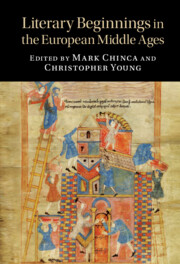Book contents
- Literary Beginnings in the European Middle Ages
- Cambridge Studies in Medieval Literature
- Literary Beginnings in the European Middle Ages
- Copyright page
- Contents
- Contributors
- Acknowledgments
- Foreword
- Chapter 1 Introduction
- Chapter 2 Scandinavia
- Chapter 3 Irish and Welsh
- Chapter 4 English
- Chapter 5 Spain
- Chapter 6 French
- Chapter 7 Dutch
- Chapter 8 Occitan
- Chapter 9 German
- Chapter 10 Italian
- Chapter 11 Czech and Croatian
- Chapter 12 Greek
- Chapter 13 East Slavonic
- Afterword
- Index
- Cambridge Studies in Medieval Literature
Chapter 5 - Spain
Published online by Cambridge University Press: 11 August 2022
- Literary Beginnings in the European Middle Ages
- Cambridge Studies in Medieval Literature
- Literary Beginnings in the European Middle Ages
- Copyright page
- Contents
- Contributors
- Acknowledgments
- Foreword
- Chapter 1 Introduction
- Chapter 2 Scandinavia
- Chapter 3 Irish and Welsh
- Chapter 4 English
- Chapter 5 Spain
- Chapter 6 French
- Chapter 7 Dutch
- Chapter 8 Occitan
- Chapter 9 German
- Chapter 10 Italian
- Chapter 11 Czech and Croatian
- Chapter 12 Greek
- Chapter 13 East Slavonic
- Afterword
- Index
- Cambridge Studies in Medieval Literature
Summary
To speak about ‘literary beginnings’ we need to acknowledge the range of texts considered ‘literary’. These are imaginative works that can be classified variously by: the medium in which they were composed (orally or in writing), their place of origin, historical time frame of their composition, subject of the composition, and/or the genre to which they belong. The twenty-first-century present from which we are pondering medieval literature is particularly exciting because it includes not only canonical texts as well as non-canonical ones, but also the systematic scrutiny of marginalia and such forms as literary fragments – some accidental, others by design. If beginnings represent originality and innovation in the context of already extant material, where do we start a literary history of medieval Spain? With the Arab invasion of 711 and the strophic poetry of Arabic or the Hebrew muwashshahs? After all, Hebrew was represented on the Iberian peninsula since Roman times, and Iberian literature, like the culture itself, was neither monolingual nor monocultural. Or should we start with the proto-Romance vernacular that was conflated with Latin – a ‘language’ that would ultimately turn into Castilian? This chapter ponders the first two generic ‘beginnings’: the subjectivity of lyric and the objectivity of epic.
Keywords
- Type
- Chapter
- Information
- Literary Beginnings in the European Middle Ages , pp. 90 - 111Publisher: Cambridge University PressPrint publication year: 2022

